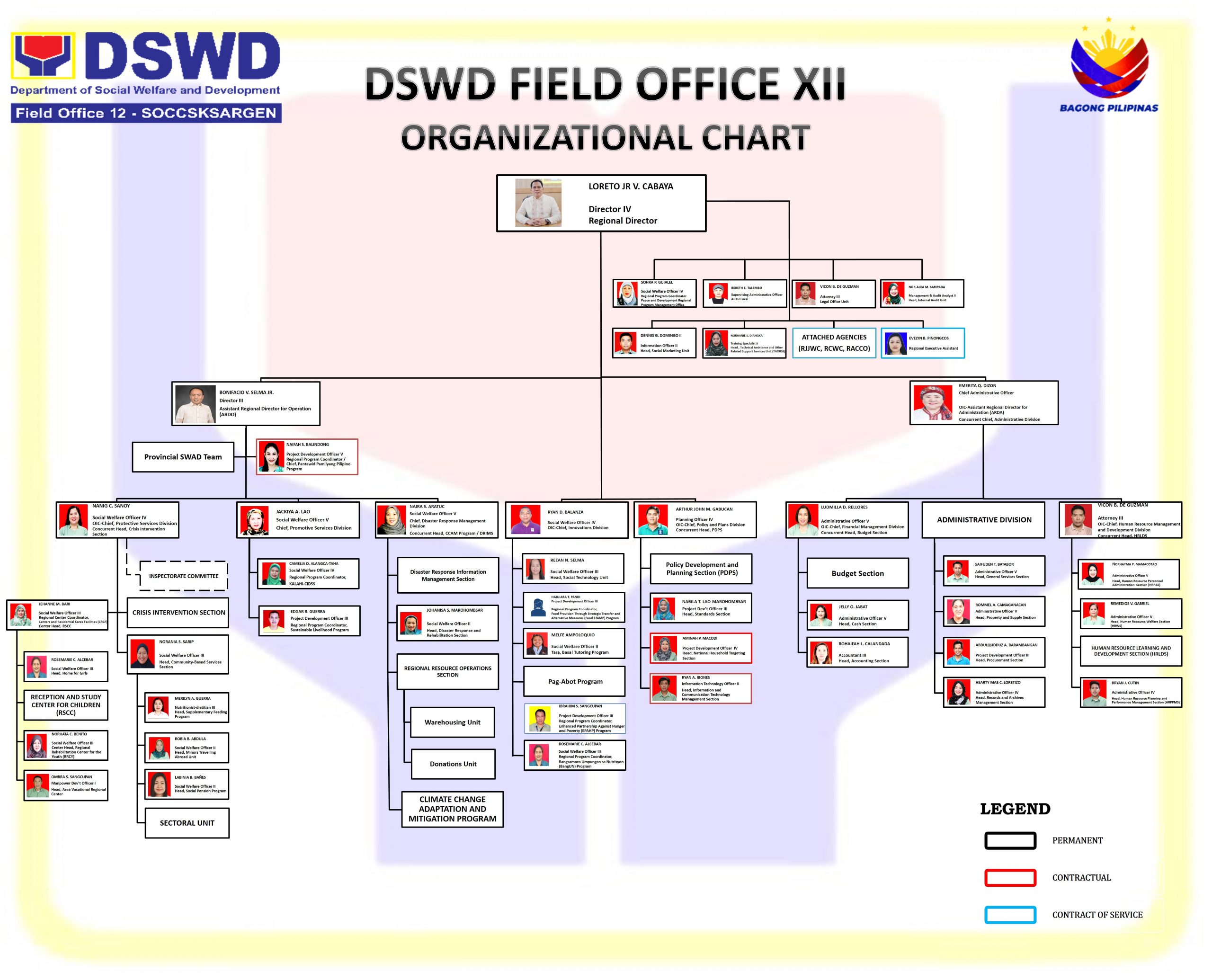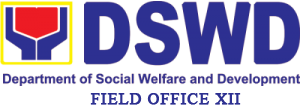DSWD Field Office XII Organizational Chart

DEPARTMENT OF SOCIAL WELFARE AND DEVELOPMENT REGIONAL FIELD OFFICE NO. 12 The Department of Social Welfare and Development Regional Field Office 12 is primarily responsible for the management and implementation of DSWD functions at the regional level. The Regional Field Office facilitates direction setting and providing resource and technical assistance to social welfare and development intermediaries within collaborative environment Promotes and ensures the implementation and enforcement of laws and policies and rules and regulations pertaining to social welfare and development within its geographical, spatial and cultural jurisdiction.
Office of the Regional Director/Assistant Regional Director
Provides overall regional direction, technical and administrative supervision in the pursuit and implementation of the agency’s vision, mission, goals and mandate.
Internal Audit Unit
Examines and evaluates the adequacy and effectiveness of internal control within the field office without intruding into the authority and mandate of Commission On Audit. It includes determining whether the organization’s network of risk management, control and governance processes, as designed and represented by the management, is adequate and functioning.
Social Marketing Unit
Responsible for undertaking advocacy, marketing and networking activities of the Field Office programs, projects, services and activities to promote social change and nurture its relationship with different public’s.
Special Projects Under the Office of the Director:
Pantawid Pamilyang Pilipino Program
is a poverty reduction and social development strategy of the national government that provides conditional cash grants to extremely poor households to improve their health, nutrition and education particularly of children aged 0-14.
Pantawid Pamilya has dual objectives:
- Social Assistance – to provide cash assistance to the poor to alleviate their immediate need (short term poverty alleviation); and
- Social Development – to break the intergenerational poverty cycle through investments in human capital.
Pantawid Pamilya helps to fulfill the country’s commitment to meet the Millennium Development Goals, namely:
- Eradicate Extreme Poverty and Hunger
- Achieve Universal Primary Education
- Promote Gender Equality
- Reduce Child Mortality
- Improve Maternal Health
National Household Targeting System for Poverty Reduction
The poorest households in the municipalities are selected through the National Household Targeting System for Poverty Reduction (NHTS-PR) implemented by the DSWD using the Proxy Means Test. This test determines the socio-economic category of the families by looking at certain proxy variables such as ownership of assets, type of housing, education of the household head, livelihood of the family and access to water and sanitation facilities.
Eligible Households
- Residents of the poorest municipalities based on 2003 Small Area Estimates (SAE) of NSCB;
- Households whose economic condition is equal to or below the provincial poverty threshold.
- Households that have children 0-14 years old and/or have a pregnant woman at the time of assessment;
- Households that agree to meet conditions specified in the program.
Set of Co-Responsibilities
To avail of the cash grants beneficiaries should comply with the following conditions:
- Pregnant women must avail pre- and post-natal care and be attended during childbirth by a trained health professional;
- Parents must attend Family Development Sessions (FDS);
- 0-5 year old children must receive regular preventive health check-ups and vaccines;
- 3-5 year old children must attend day care or pre-school classes at least 85% of the time.
- 6-14 year old children must enroll in elementary or high school and must attend at least 85% of the time.
- 6-14 years old children must receive deworming pills twice a year.
Program Coverage
Pantawid Pamilya operates in 80 provinces covering 734 municipalities and 62 key cities. The Pantawid Pamilya targets to cover 1 million households by end of 2010.
KALAHI-CIDSS: KKB
The Kapit-Bisig Laban sa Kahirapan – A Comprehensive and Integrated Delivery of Social Services: Kapangyarihan at Kaunlaran sa Barangay or KALAHI-CIDSS: KKB is a poverty alleviation program of the Philippine Government, a community-driven development project implemented by the Department of Social Welfare and Development (DSWD). The Project aims to contribute to poverty reduction by empowering communities through increased participation in community activities and enhancing local governance by promoting transparency and accountability practices. The KC project has three major components: (a) social preparation, capability-building and implementation support; (b) provision of funds for community projects; and (c) monitoring and evaluation. In Region XII, the KC project operated in 10 selected municipalities in Sarangani Province, Sultan Kudarat, South Cotabato and Cotabato Province. An off-shoot of the KALAHI-CIDSS, the Community Driven Development-Local Planning Process Harmonization Pilot Initiative or the Makamasang Tugon is also implemented in two phase-out municipalities in the region.
For 2010, the KC Project operates in two new municipalities under the KC Additional Financing (KC-AF). These are the municipalities of Maasim and Maitum, both of Sarangani Province.
Operations Division
Covers the Units that implements the retained programs and services of the Department that includes Disaster Management, and Crisis Intervention Unit, Center-Based Services, Community-Based Services such as the Self-Employment Assistance- Kaunlaran, Child Care Placement Services, Child Protective Services, Travel Clearance for Minors traveling abroad and the Institutional Development Unit that implements organizational capability building programs for the agency’s employees and other individuals or groups engaged in social welfare and development activities.
Technical Assistance Division
Composed of the following units: The Policy and Plans Unit is responsible in the monitoring and evaluation of policies and plans of the agency and of the social welfare development sector, including resource accessing for specific projects of the agency, LGUs, NGOs, POs and other intermediaries of social welfare and development; The Standards and Regulations Unit is responsible for the development of quality assurance measures and regulates the implementation of SWD policies, rules and regulations through the registration, licensing and accreditation functions. Its jurisdiction covers individuals, public and private agencies and organizations engaged in SWD activities, including fund drives and other forms of solicitation for public welfare purposes; The Social Technology Unit implements conceptualized and develop and pilot test projects of the agency; The Regional Management Information Systems Unit is responsible for the promotion of the appropriate, timely and cost-effective use of Information and Communication Technology [ICT] to improve the delivery of social welfare vision, mission and goals in accordance with the government ICT vision of improving governance and adoption of best IT practices.
Management Division
This covers the General Administration and Support Services of the Regions such as: Human Resource Management Unit (HRMU) Responsible in providing services relative to human resource management such as personnel transactions, employees welfare, career planning and development, aimed at enhancing the competence of staff in all levels and categories, in accordance with CSC laws, rules, policies and regulations; Finance Management Unit (Budget, Accounting and Cash) Responsible for the implementation and enforcement of financial policies and financial management to ensure prompt processing of claims and timely compliance with reporting requirements of the Central Office and the COA; General Administrative Services Unit covers Records Management, Property and Facility Maintenance, Transportation, Communication, Security, Utility and Janitorial Services of the Region; Procurement and Supply Unit covers procurement of goods and services; property and supply management.
Centers and Institutions
The operation of centers and institutions is one of the retained programs and services of the Department .The following centers and institutions: Reception and Study Center for Children [RSCC]; Group Home for Girls (GHG); Center for the Handicapped (CH); and Regional Rehabilitation Center for Youth (RRCY). Centers and institutions are directly under the administrative supervision of the Regional Director, while the Operations Division initiates monitoring and coordinating functions.
